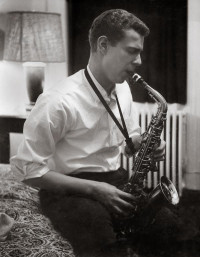In Your Own Sweet Way—A Bill Evans Memory
It was the kind of New York night not fit for man nor beast. Sleet and wind whipping about, snow banks and ice everywhere. With my ‘49 Dodge slipping and sliding on the Village streets, I make my way to the Vanguard to catch the midnight set. The small sign outside the entrance inconspicuously announces: “Bill Evans Trio.” This is the 1962 edition of the trio, reformed after bassist Scott LaFaro’s death the year before; and this is the club where Bill had played his last sets with Scotty, with whom he had such unearthly musical empathy, before the fiery car crash that ended his life. (Those final, magical sessions were captured for posterity on two historic Riverside live albums, Sunday at the Village Vanguard, and Waltz for Debby.) The trio still has Paul Motian on drums, but now features the young Chuck Israels on bass, in the unenviable position of trying to fill LaFaro’s role.
As I finish my descent down that famed, steep staircase, I can see that there are only a few people in the club on this winter weeknight. I take a table right in front of the bandstand and order a beer. What a cozy and warm contrast to the storm raging outside, just above this basement jazz oasis; here I am, nestled in my favorite club—which feels even more intimate than usual tonight with so few patrons—and about to hear my very favorite musician. Within a few minutes the trio walks onto the stand, and without any noticeable communication but seemingly as one mind begins playing “How Deep Is the Ocean.” I listen raptly, mostly with my eyes closed. The music is transporting, the interplay like a finely tuned conversation. When the tune ends I clap and in that moment realize with a shock that I am now the only remaining audience member, the few others apparently having slipped out at the start of the set.
Zen question: What is the sound of one pair of hands clapping in a jazz club? Answer: Emptiness. And that just felt so wrong, especially given the magnificence of this trio’s music. Bill and his cohorts, however, seem unfazed (how many other times has something like this happened, I wonder) and they continue without comment to the next tune, which I recognize as “How My Heart Sings.” They then go on to play a full forty-five-minute set. As I listen I’m in a weirdly ambivalent state—alternately uncomfortable and rapturous—as I feel bad for the musicians yet am also ecstatic at witnessing this giant playing an entire set for an audience of one…at being that audience of one! I applaud enthusiastically but it’s still very much a hollow and pathetic sound. (Much later I wish I would have jumped from table to table clapping, whistling and cheering to simulate a fuller and more appropriately boisterous audience—perhaps they would have at least gotten a laugh out of that.)
At the end of the set I see Bill standing near the stairs and I approach and thank him for the marvelous music. And then, knowing that music at the Vanguard typically continues for a couple more hours—and fully displaying my twenty-year-old naiveté—I actually ask the great Bill Evans if he’s going to play another set! He smiles sweetly, with none of the condescension, irony or even hilarity that would have been fitting under the circumstances, and says simply, no, he doesn’t think so. I bid him goodnight and climb those stairs from the empty club to the blizzard waiting at street level.
how my foolish heart sings
how deep is the detour ahead
so very early my man’s gone
_____

The author in 1963
*

Robert Hecht is an award-winning jazz disc jockey and fine art photographer whose photo work has been published in LensWork, Black & White, Zyzzyva and The Sun and exhibited internationally. His writing has previously appeared in LensWork and in the haiku journals Frogpond, Bottle Rockets and Modern Haiku. He and his wife live in Portland, Oregon. For twenty-five years they have been partners in On Point Productions, writing and producing marketing and training video programs. Visit his website by clicking here.
*
In 1935, the Village Vanguard began as a music club that featured primarily folk music and poetry readings. Since 1957, it has predominately featured jazz music
The entrance to the Vanguard

The stairway leading into the basement club

The interior of the club

Click here to see more photos of the Village Vanguard
The 1962 recording of the Bill Evans trio playing “How My Heart Sings,”
A 1965 film of Evans, Chuck Israels and Larry Bunker playing “How Deep in the Ocean”













































a terrific article and the pictures put me there …